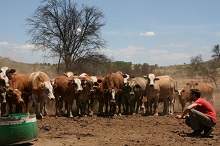Research interests
- Bacterial communities
- Host-bacteria associations and coevolutionary processes
- Human-wildlife conflict
- Impact of livestock farming on wildlife species

My research focusses on the investigation of domestic and wildlife microbial communities using next generation sequencing approaches with the aim to understand how intrinsic and extrinsic factors shape these host-bacterial relationships. The overarching aim thereby lies in understanding natural variations in these host bacterial communities in order to distinguish those from microbial community changes caused by human encroachment, which might have consequences for host health. In addition, I also use high-throughput sequencing approaches (barcoding) to investigate diets in wildlife species or to investigate the microbial diversity in water bodies. Besides my research activities, I am currently involved in teaching bachelor and master students at Ulm University in different biological subjects such as Ecology, Genomics, Bioinformatics and Statistics.
Scientific projects
A very prominent land-use type in central Namibia is livestock and game farming where cattle and wildlife species use the same habitat. In our project, we investigate if livestock-associated bacteria and antibiotic-resistant bacterial strains are present in wildlife species that live on livestock farms and are exposed to faecal matter of cattle. Furthermore, we are interested to which extend waterholes are contaminated and thus contribute to a bacterial exchange on farmland by attracting domestic as well as wildlife species. In addition, we examine how various intrinsic and extrinsic factors and coevolutionary processes shape bacterial communities using two prominent sympatric carnivores as focus species, the black-backed jackal (Canis mesomelas) and the cheetah (Acinonyx jubatus). Our health screening methodology relies on ‘next generation sequencing’ of 16s rRNA of gut bacteria, virus detection by PCR and gastrointestinal helminth load quantification by conventional microscopy. On the host side, we further address the effect of population structure (neutral marker), immunogenetic diversity (MHC) and the diet (‘next generation sequencing’).
Dr. Sebastian Menke currently applies his scientific knowledge as bioinformatician in the Human health sector.
Publications
Menke S, Heurich M, Henrich M, Wilhelm K, Sommer S (2019) Impact of winter enclosures on the gut bacterial microbiota of red deer in the Bavarian Forest National Park. Wildlife Biology, 1, doi:10.2981/wlb.00503.
Menke S, Gillingham MAF, Wilhelm K, & Sommer S. (2017). Home-Made Cost Effective Preservation Buffer Is a Better Alternative to Commercial Preservation Methods for Microbiome Research. Frontiers in Microbiology, 8, 102.
Menke S, Meier M, Mfune JKE, Melzheimer J, Wachter B, Sommer S (2017). Effects of host traits and land-use changes on the gut microbiota of the Namibian black-backed jackal (Canis mesomelas). FEMS, 93(11). (doi:10.1093/femsec/fix123)
Menke S, Meier M, Sommer S (2015) Shifts in the gut microbiome observed in wildlife (Giraffa camelopardalis, Antidorcas marsupialis) fecal samples exposed to natural weather conditions: lessons from time series analyses using next generation sequencing for application in field studies. Methods in Ecology and Evolution, 6(9), 1080–1087.
Menke S, Wasimuddin, Meier M, Melzheimer J, Mfune JKE, Heinrich S, Thalwitzer S, Wachter W, Sommer S (2014) Oligotyping reveals differences between gut microbiomes of free-ranging sympatric Namibian carnivores (Acinonyx jubatus, Canis mesomelas) on a bacterial species-like level. Frontiers Microbiology, 5, 526.
Menke S, Böhning-Gaese K, Schleuning M (2012) Plant–frugivore networks are less specialized and more robust at forest–farmland edges than in the interior of a tropical forest. Oikos, 121, 1553–1566.
Contact
- Dr. Sebastian Menke
Email: sebastian.menke()posteo.de
